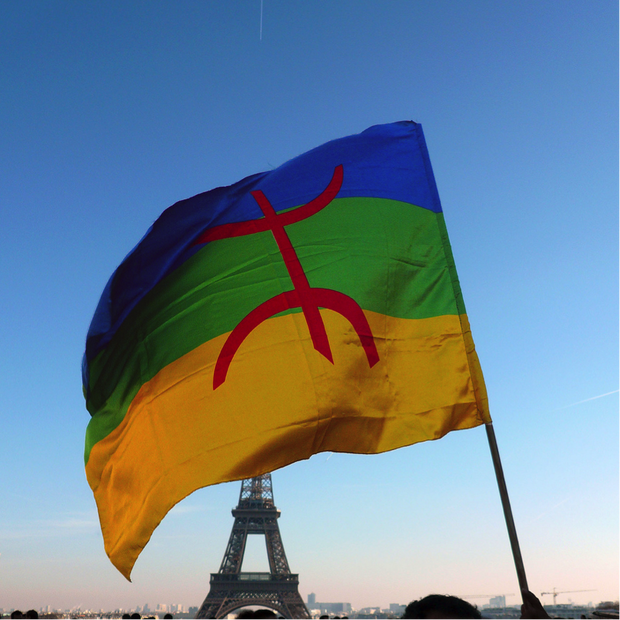PG Showcase: Jonathan Harris on the Berber diaspora

The Amazigh Flag, designed in Paris in 1967 and popularised by the Académie Berbère Source: Pascal Berger http://commentdire.canalblog.com/archives/2008/02/12/7919696.html
France is dotted with hundreds of Berber cultural associations, linking together hundreds of thousands of North African immigrants and their descendants. Amazigh/Berbers (Amazigh means ‘free man’ in the Berber language, Tamazight) define themselves as non-Arabic, indigenous people, regrouping isolated populations from across the mountains, deserts and oases of North Africa. Although constituting large regional minorities, particularly in Morocco and Algeria, the Berbers were written out of the constitutions of the post-colonial nation-states that succeeded French colonisation, most of which were to be strictly ‘Arabo-Islamic’. Claiming Berber identity or even speaking the language was seen as a threat to national unity, a divide-and-rule ‘myth’ invented by the French, and was repressed by these new states.
It was in the diaspora that Berber immigrants, refugees, exiles and intellectuals from across this vast region could meet, organise themselves, and work on an emergent ideology of pan-Berberism. From small beginnings in late 1960s Paris, this ideology has grown into a transnational political and cultural movement with wide-ranging impact across North Africa. Tamazight is now an official language in Morocco and Algeria. Calls for greater autonomy for Berberophone regions are made under the pan-Berber flag designed in Paris by the Académie Berbère, in Libya and Mali as well as Algeria and Morocco. The diaspora remains a privileged space of debate, leadership, and freedom of expression, which in today’s world of instant international communication has allowed it to remain ‘plugged in’ to developments on the ground.
My project, funded by the ESRC, investigates the contemporary politics of this diasporic identity movement based in France. Lacking a structuring nation-state, this diaspora must constantly assemble itself, rehearsing and performing Amazighité in the process. What does this differentiation from an Arabo-Islamic Maghrebin identity mean for individual and collective integration in French state and society, alongside increasingly powerful anti-immigration and Islamophobic political discourse? Diasporas have long been recognised as sites where questions of citizenship are brought into focus – so how does the Amazigh diaspora negotiate their substantive and formal citizenship vis-à-vis France and their homeland? They remain attached to their homeland through an articulation of indigenous identity, but how do the Amazigh diaspora’s leaders do this at a distance – can the Amazigh of France constitute an indigenous diaspora? How does living in France, becoming French citizens, make this articulation possible? Finally, as the Berber movement has matured it has become increasingly internally differentiated as regional groups articulate their own, ethnolinguistically specific, identities. My research investigates how these developments change the imaginative geographies, territorialities, and spaces of organisation of the diaspora.
Jonathan Harris, University of Cambridge
